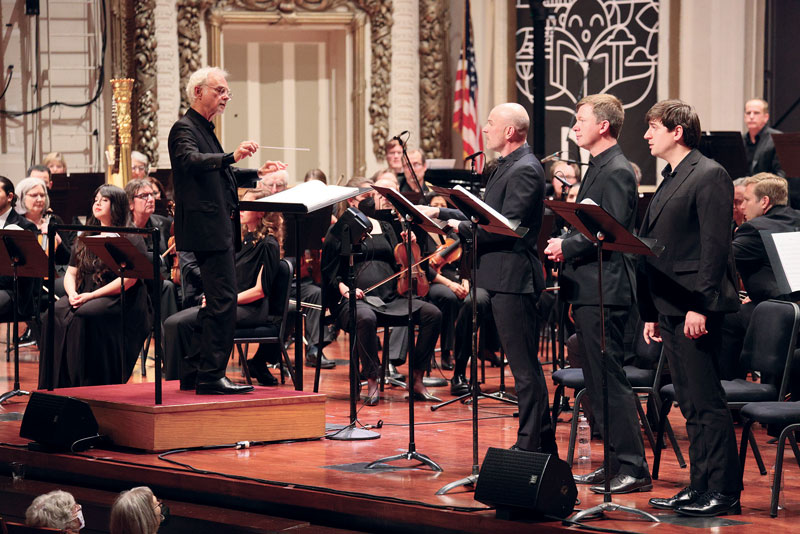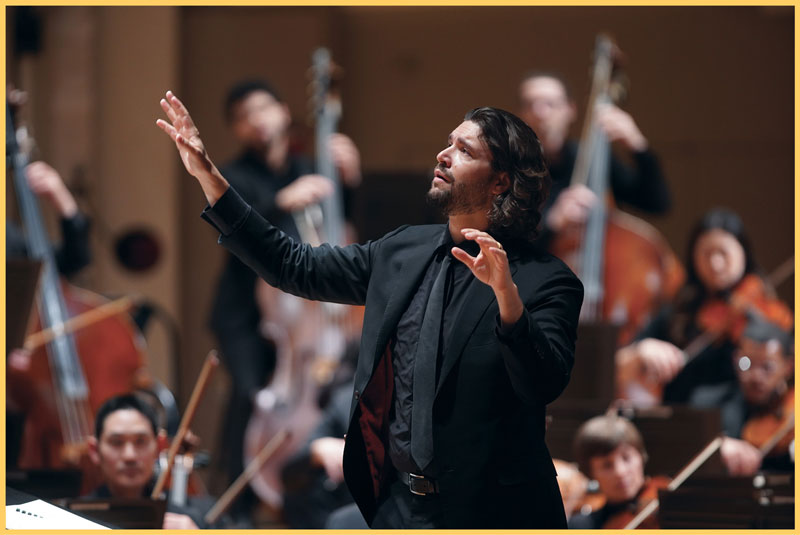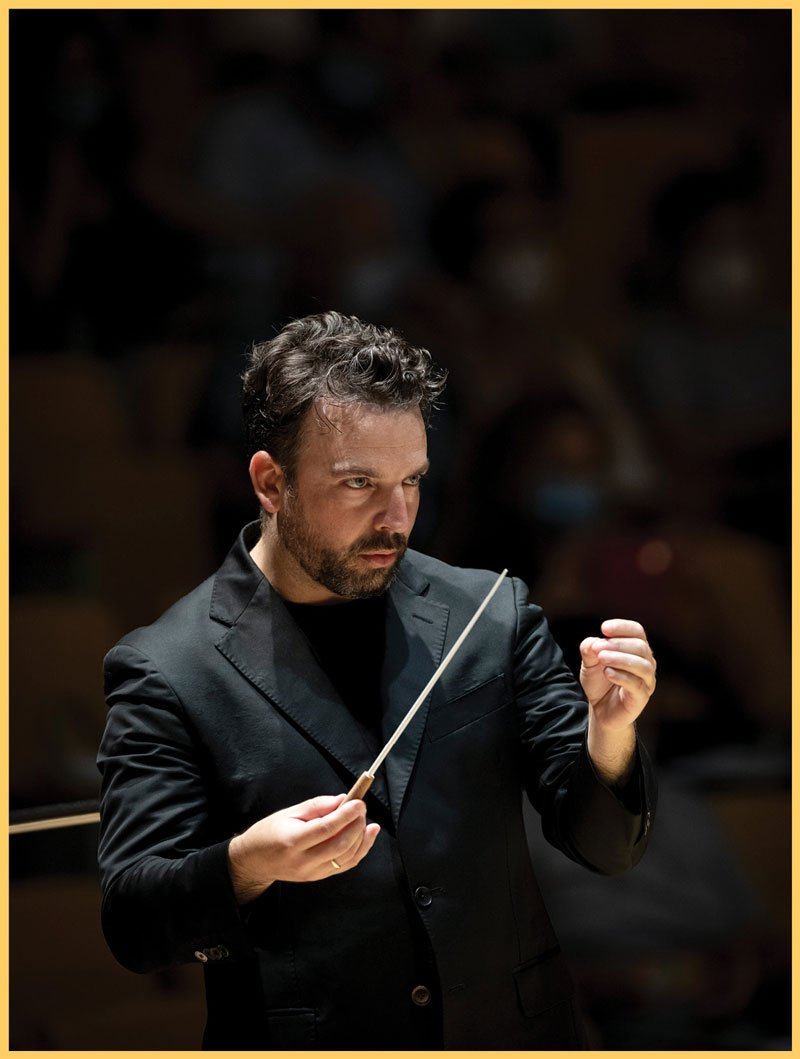Rephrasing the Familiar
This fall, Christian Reif and James Gaffigan explore two juggernauts of the repertoire, with a twist
by Hannah Edgar
If you’ve heard John Adams’ El Niño, last heard in Cincinnati at the 2022 May Festival, you know it’s a work that resists easy summary. The emotional heft of Adams’ multilingual opera-oratorio on the Nativity story is matched by its musical forces, meaning they’re massive: soprano, mezzo-soprano, baritone and a trio of countertenors; a full orchestra with guitars and a sampling keyboard; and both an adult chorus and a children’s chorus.

Those specs alone put El Niño well out of reach for most small, and small-budget, ensembles. Conductor Christian Reif and soprano Julia Bullock want to change that. With Adams’ blessing, the husband and wife team created El Niño: Nativity Reconsidered, an hour-long chamber version of Adams’ original, coming to the CSO Proof Series on November 30.
Reif and Bullock first encountered El Niño at The Juilliard School, where they met. The two listened to it together for the first time and were floored.
“We were sitting there [in my apartment] in tears. Since then, we’ve been in love with the piece,” Reif says.
When El Niño rolls through Cincinnati, Reif will be making his fourth appearance with the orchestra in half as many years. But it wasn’t planned that way. Because symphony seasons are plotted out years in advance, Reif’s CSO concerts on September 30 and October 1 were intended to be his orchestra debut. He accidentally ticked that box back in February 2022, subbing last-minute in a program anchored by John Adams’ teeming, 35-minute City Noir. He stepped in again in April 2023 to lead Shostakovich’s Symphony No. 5 and Rachmaninoff’s Piano Concerto No. 1, with pianist Stephen Hough.
So, what was intended as an introduction will actually be a reunion—and a very happy one, says Reif.
“It’s a dream, making music with the Cincinnati Symphony Orchestra,” Reif says. “Both times, we were able to tell a story with the pieces we played. I’ve been lucky to have wonderful experiences everywhere, but I would say it’s been one of the highlights both times. They’re so open, enthusiastic and willing to try out things.”

For the September 30/October 1 program, Reif and the CSO will tackle a work that thrills even the hardiest symphony veteran: Stravinsky’s The Rite of Spring. The ballet, whose 1913 premiere was divisive enough to incite a small riot, has given us one of the most famous concert pieces of all time and become “almost a [box office] draw,” to Reif’s amusement. Like so many classically trained musicians, Reif has studied The Rite since his student days at the Mozarteum in Salzburg, Austria. Even so, every performance turns up new surprises and nuances.
“It’s a piece that just keeps on giving. Suddenly, you’re like, ‘Oh, that little piccolo entrance there…’ or, ‘Okay, how do I balance the oboe with the trumpet while everyone else is also playing?’ It’s been a real joy to do that.”
Reif’s very terpsichorean program also features excerpts from Falla’s opera La vida breve, which jounces with Spanish dance rhythms, and Prokofiev’s Violin Concerto No. 2, a work Reif has been digging into in recent months.
“The throughline of it all is their groundedness, the feeling of being rooted in the earth,” Reif says.
The Prokofiev will spotlight German violinist Clara-Jumi Kang in a rare stateside appearance. A “dear friend” of Reif’s, Kang lives close to Reif and Bullock in Munich—in fact, in the same building as Reif’s brother, the concertmaster of the Bavarian Radio Symphony Orchestra, and his wife, piano soloist Alice Sara Ott (who will perform with the CSO in May 2024).
With a family of musicians, it goes without saying that Lukas, Reif and Bullock’s infant son, will grow up around plenty of music. The couple took time off after Lukas’ birth last fall and found that parenthood changed their approach to, well, everything. Even their El Niño is sounding in new ears.
“We conceptualized it many years ago, when we did not know that we would be parents. But performing it as a parent…. Yeah, that definitely changed it,” Reif
■ ■ ■

Connecting with Fanfare from Valencia, where he’s music director of the Palau de les Arts Reina Sofía, James Gaffigan is also juggling parenthood with podium appointments. He speaks a notch or two softer than usual so as not to disturb his son sleeping nearby, but his excitement over his return to Cincinnati on October 27 and 28 registers loud and clear.
“I think that there are few magical cities in the United States…and Cincinnati is a perfect example of that. It’s the definition of an American city, really, in size and strength. The possibilities are endless in cities like that,” Gaffigan says.
Much like Reif’s twist on El Niño, Gaffigan’s CSO appearance turns a hulking titan of the canon on its head: an orchestra-only medley from Wagner’s Ring cycle, arranged by the late conductor Lorin Maazel. Maazel no doubt faced an even more daunting assignment than Reif and Bullock when he abbreviated the four-opera cycle—between 15 to 17 hours of music—into an unbroken 75-minute-long compilation. Other conductors have taken a stab at the concept of a concert Ring, like Otto Klemperer and Leopold Stokowski, but Maazel’s version manages to sound most seamless.
“Maazel cleverly, sometimes even with one bar, transitions from one thing to another in a very gentle way. I think even Wagner would have approved,” Gaffigan says.
After a pandemic cancelation, in 2025 Gaffigan will finally conduct his first opera in the cycle, Die Walküre, at a to-be-announced major company. In the concert version, however, he’s struck by the evocativeness of the Ring’s leitmotifs, or the musical themes that recur throughout the work like signposts.
“Wagner wasn’t someone I’d like to have dinner with. However, you can’t mistake his genius in crafting a piece of music drama—I mean, he was basically doing movies before there were movies,” Gaffigan says. “He plants seeds in your brain, little musical germs, and then he brings them back so you’re comfortable. Because that’s what life is, isn’t it? You go away from home, and then you return nostalgically to things that you’ve loved.”
Maybe you’ve been curious about the Ring cycle but cowed by its titanic length. Or maybe, in Gaffigan’s words, you’re “intimidated by hearing people scream in German, which I don’t blame [you] for.” The Ring Without Words is a rare opportunity to dip into Wagner’s soundworld without taking a full plunge.
Gaffigan adds, “For the public and for the musicians, it’s a real event. If you’ve never heard a Wagner opera, this is the perfect way to whet your appetite for that.”